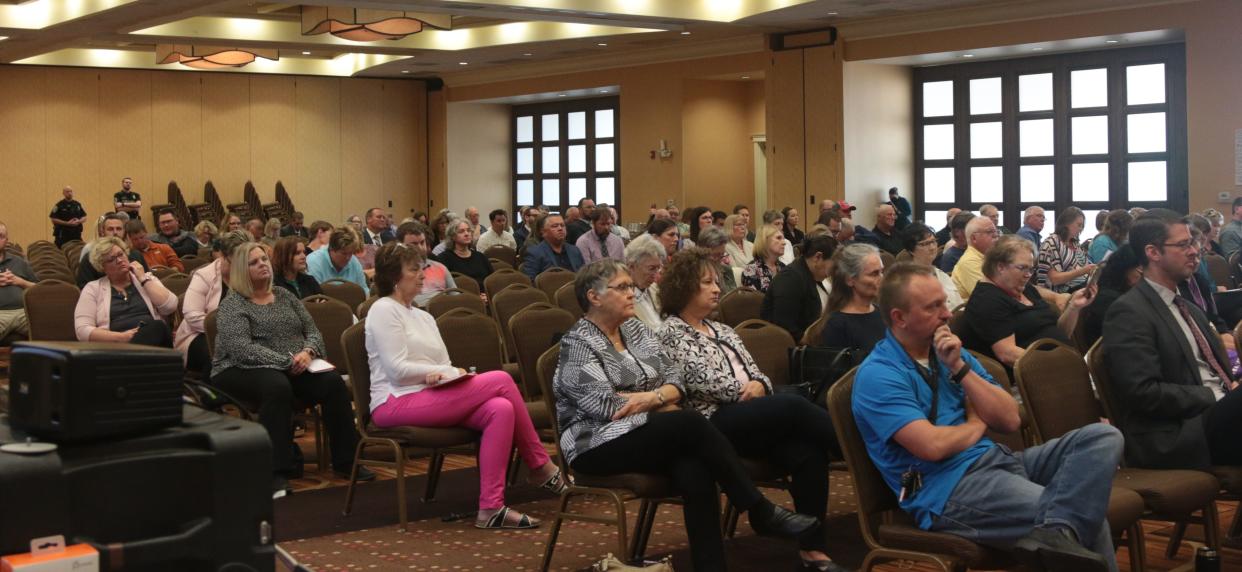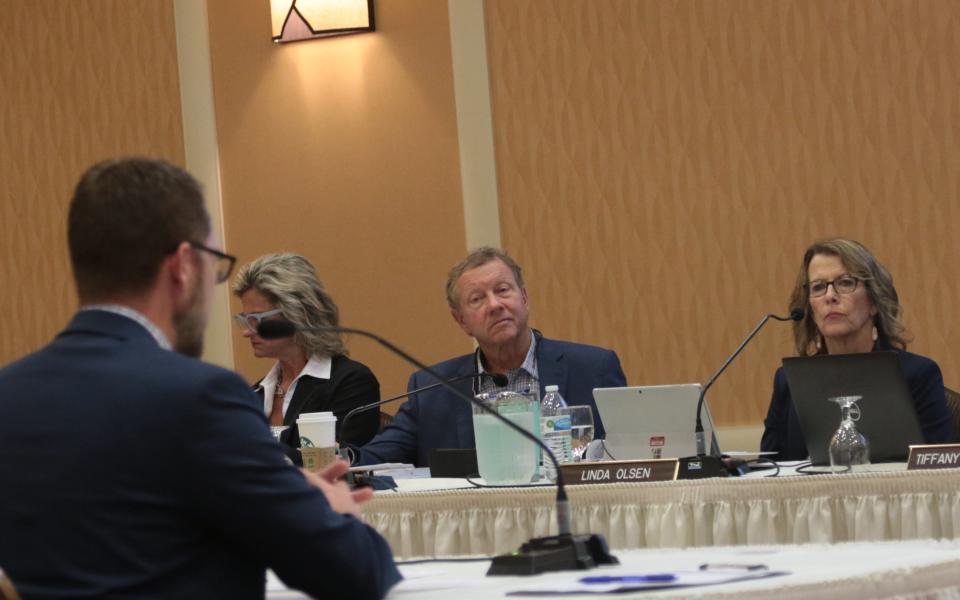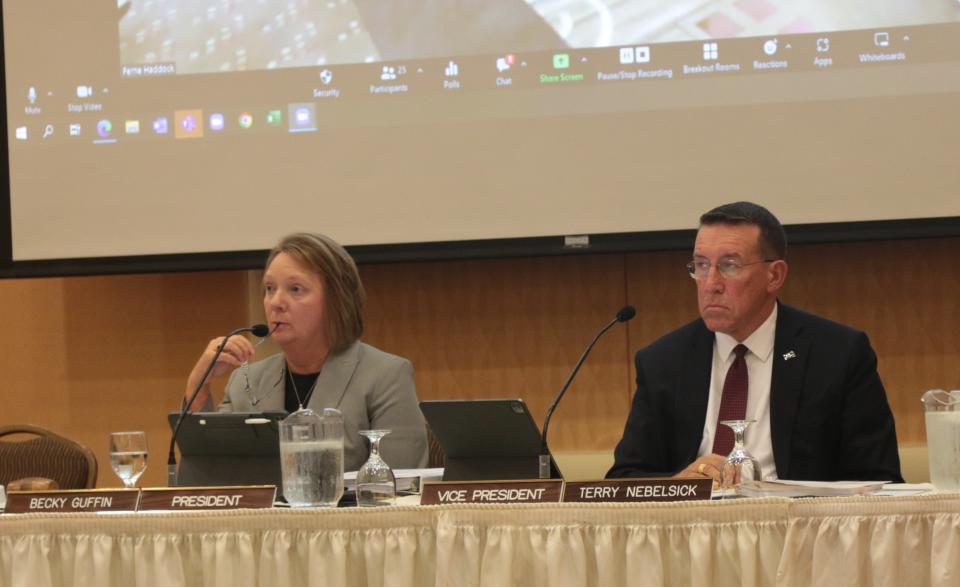'Let's not forget where our focus truly begins': Dozens in Aberdeen weigh in proposed social studies standards

Will the proposed social studies content standards develop a higher level of rigor in the classroom or set a host of benchmarks that are unattainable for the age groups identified?
A host of perspectives on that topic were heard Monday at the Dakota Event Center in Aberdeen, in what was the first of four public hearings to discuss proposed content standards for social studies as well as career and technical education.
The 2022 standards are the second version of social studies standards to be drafted. Initial standards drafted in 2021 were pulled after all references to the Oceti Sakowin essential understandings and standards were removed by the Department of Education. This ultimately led to the creation of a new committee to draft social studies standards.
Discussion on standards for career and technical education; business; hospitality and tourism; marketing; transportation, distribution and logistics and capstone experience detailed minimal changes and garnered only a couple comments.
More: Retired educators uneasy about recent political, cultural pressures imposed on teachers
But, the 20 people registered to speak in favor of the social studies standards had time to share their thoughts in addition to one person in the audience, time only allowed for 27 opponents to testify leaving eight opponents unheard.
The public hearing was set up with time limits for both proponent and opponent testimony with 90 minutes of testimony allowed from both sides. Additionally each person's comments were limited to f4 minutes. Those unable to testify Monday will have opportunities to testify at the next public hearing Nov. 21 at Carnegie Town Hall in Sioux Falls. Two additional public hearings are planned in Rapid City and Pierre in 2023, although the dates for those meetings have yet to be announced.
State leaders acknowledge the standards are a significant change
The drafters of the proposed social studies standards said they feel the standards provide a challenge that's needed in the classroom with topics that build on memorized facts in the early grades to greater understanding in the later years.
Tiffany Sanderson, the state's education department secretary, said the standards are a foundation for lesson plans and classroom experiences.
"While we want them to graduate, we want them to graduate as responsible citizens and active voters," she said.
More: Aberdeen school board candidates asked about Native American history, teacher shortage at forum
Sanderson said the standards introduce vocabulary early, and build meaning over time.
Ben Jones, former education secretary and current director of the South Dakota State Historical Society, said these standards are a "fundamental shift" from the current social studies standards, but the goal is to provide students with a better understanding of history. The standards cover people, places and events in chronological order and dig deeper as students progress through school.
As to the concern that there's too much memorization, Jones said, "The idea that there are ages for appropriate items has no support historically."
Shannon Malone, director of learning and instruction with the education department, also said the standards aren't unique with 5,000 public schools and administrators looking to adopt these standards and 1,300 public schools currently using the core of these standards.
"The committee looked at every aspect of these standards, adding and deleting," she said. "The content standards provide a road map, a framework for instruction to establish consistency across the state."
Malone said the curriculum used to teach the standards is still left to the school districts, and $805,000 has been set aside to support implementation by the school districts. Training for teachers is expected to begin in the summer of 2023.

Supporters favor the higher rigor proposed in the standards
Rachel Oglesby, chief of policy for the governor's office, testified about the effectiveness of this approach, which is considered a classical school curriculum as she graduated from a school with this type of instruction.
While there is memorization of facts and even the preamble of the U.S. Constitution at an early age, she said this wasn't something that was difficult for her at a young age.
"Knowing these early on made it easy in middle school and high school," she said.
She noted education went from learning facts to arguing issues and developing their own public views.
"I'm blown away at the comments that these are too hard for kids to handle. There are thousands of kids who follow these standards," she said. "I see no reason to believe students won't be as hard working as I."
Additional supporters who testified ranged, from committee members like Dylan Kessler, who detailed the process used to craft the standards, to parents who voiced support of the additional rigor proposed.
"They present something missing in society today," Kessler said. "Let's not forget where our focus truly begins. It's not to teachers or administrators, it's the student of South Dakota to whom we have a responsibility."
Other supporters called the standards a vast improvement, something K-12 students can handle and a way to provide a better understanding of history.
Standards that highlight the history of Christianity have been criticized, with some feeling it could get schools into trouble legally when it comes to the issue of separation of church and state. But supporters said it's also important to learn the church's influence.
Parent and board member Elaine Simons, from Wall, pointed to issues with current standards.
"Current history curriculum is full of errors, because it's poorly written," she said. "We do a disservice to continue to use bad curriculum. The current proposed standards require accurate and in-depth curriculum."
State Rep. Sue Peterson, a member of the committee who helped draft the 2021 standards, said she didn't support the previous proposed standards, but does support these standards.
More: How student loan forgiveness will affect South Dakota's college graduates, new workforce
And content standards researcher Joy Pullman said these standards can be taught, because they already are.
"These standards are among the highest quality that I've seen," she said.

Opponents don't challenge the rigor, but rather age appropriateness
Samantha Walder, an administrator who sat on the social studies standards revisions, was among those who opposed the final product.
"This was a curriculum review, not a standards review," she said referring to the pre-written standards provided to the committee. "This will be a complete change to a classical model, which is outside the purview of a standards review committee."
Other members of the first social studies standards committee also took a contrary view opposing the 2022 standards and, instead, proposed a rejection of these standards and reconsideration of the original 2021 standards.
And teacher after teacher appeared, expressing concerns about the extensive requirements in these content standards and whether there would be sufficient time to cover everything.
School administrators questioned if other courses would be eliminated because of the increased focus on social studies and whether these standards would make it even more difficult to recruit teachers.
Harrisburg teacher Tamara Huffman said she has 13 standards for middle school history with 41 anchor standards. The proposed changes would maintain 13 standards, but has 131 anchor standards.
More: Puerto Rican restaurant opens, new electronic repair shop on Moccasin Drive: Business roundup
"It's unrealistic for one teacher to cover all this in one school year," she said. "They can't dig deep into these topics."
Teacher Amy Long said South Dakota prides itself on local control.
"South Dakota teachers who care deeply were almost cut completely out of this process," she said. "I'm concerned that this would happen without input from people who would be most affected."
Other teachers, like Lisa Woodward, questioned why this fundamental change needed to happen. Adults may not remember the three branches of the government, she said, but it's not because it isn't being taught.
Still, others pointed to concerns about elementary standards that call for memorization of information student may not yet understand and the expectation that they will understand ancient civilizations.
Central government teacher Kerry Konda said the standards he would teach include covering 27 different documents or one document every 1.6 days with the current block schedule used in Aberdeen.
"This doesn't include context to learn these documents, which is the most important part," he said.
As an alternative, Konda suggested the list be split between required and optional documents to cover.
More: 'Fighting Over Sioux' covers all sides of UND logo debate at South Dakota Film Festival
Retired geography teacher, Kurt Drube, said his concern is with the lack of geography standards that are included. Drube said not too long ago there was an effort to successfully add geography standards, but the new standards are weak in that regard. Those standards focused on teaching location, place, interaction, movement and regionalization.
"The one thing that dominates is location," he said. "That's important, but that's not all that geography is. This is a disservice to the children of South Dakota.
Both sides talked about standards related to Native American history
Supporters of this draft of content standards also said more focus was placed on ensuring Native American history was included.
"I found a well-balanced and inclusive history of Native people," said David Flute, cabinet secretary for the Department of Tribal Relations.
Not only will students learn about key figures, he said, but high school students will be required to learn about tribal structure, government and constitutions.
"Without a doubt, these proposed standards advance the knowledge of Native American History," said Fred Osborn, director of the South Dakota Board of Indian Services.
More: $1B plant that will produce jet fuel, have zero carbon emissions breaks ground near Lake Preston
Osborn said his office presented recommended standards at each meeting and those recommendations were discussed by the committee.
"Students will learn the good with the bad," he said.
More than once, however, opponents said these standards violate the Constitution because they did not get tribal consent.
Sherry Johnson, tribal education director for the Sisseton Wahpeton Oyate, said the standards also aren't in an approved content standards format: There's no mastery of content; standards aren't developmentally appropriate and the standards were given to the committee already written.
Following testimony, the Board of Education Standards Committee heard that more than 700 comments were submitted prior to Monday's public hearing. Of those, 67 were in support of the proposed standards, 615 were opposed and 25 held a neutral position.
This article originally appeared on Aberdeen News: Dozens in Aberdeen weigh in proposed social studies standards

